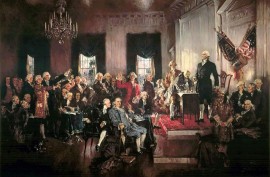
I went to the Second European Citizens’ Convention in Vienna last week, and said a few words in a discussion about how a future constitution might be ratified. An earlier speaker, Sergio Pistone, had spoken of the importance of majority voting, rather than unanimity, in enabling the American colonies to adopt the constitution of the United States of America in 1788. Undoubtedly majority voting was important, but there was something else, too.
The colonies also had a strong sense that they had to work together and that they had no alternative. They had fought for their independence from Britain together, with the assistance of other European powers. What had started as a colonial rebellion, within the context of traditional English-style debates about politics and the origins of political power, had turned into a full-scale intra-European war. The newly-independent United States knew that unless they could unite, they would suffer from the fact of their divisions in the future. Conflicting interests of the different European powers had found expression in war on their territory: they had to make sure that this could not happen again.
This meant that their need to find a way to work together outweighed their concerns about the detail of the way in which it was proposed that they should work together. And they all knew this. It became clear to North Carolina and Rhode Island that they would not get any other deal from the other states, and the overriding need to be part of the American federation won the day.
If the demand for majority voting rather than unanimity in adopting the European constitution is to have the same effect in unblocking the process of ratification, then we must also create the same sense of need to unite. The obstacles to unity in Europe are not merely technical but are rooted in the very sense of what it is to be European, namely the deep and profound diversity of our continent.
Here are two examples of the problem.
First, consider the Iraq war. Europe was divided. The British wanted to rally the rest of Europe behind the American policy; the French wanted to rally them against the American policy. Neither got their way: at such a profound moment, European attempts at agreeing a common policy failed. If the European countries could not agree on a foreign policy, they would not be able to agree on a constitution.
A second example is taxation, its level and the uses to which it is put. Mr Donfut [an earlier speaker from the Belgian government] spoke of the need for agreed minimum levels of social provision, with dedicated resources to match and some measure of harmonisation of fiscal policies. Without taking a view on this proposal myself, it is enough to observe merely that this is not the consensus view in all of Europe. In fact, it is quite controversial. The point is that European countries do not agree on this issue at the moment. If they cannot agree on a tax policy, they cannot be expected to agree on a constitution.
So, while the recognition of the majority principle in adopting the European constitution is important, it is not enough. There must also be the recognition of the need for Europe to unite. I have given two examples of where that recognition does not yet exist, and no doubt there are more. We have to win this argument – about why Europe should be united – before we can win the argument about how it should be united.
